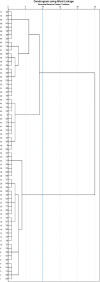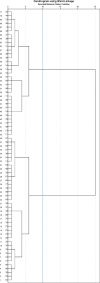Social Cognition in Children With Non-specific Intellectual Disabilities: An Exploratory Study
- PMID: 32849105
- PMCID: PMC7431697
- DOI: 10.3389/fpsyg.2020.01884
Social Cognition in Children With Non-specific Intellectual Disabilities: An Exploratory Study
Abstract
Social cognitive abilities - notably, Theory of Mind (ToM) and social information processing (SIP) - are key skills for the development of social competence and adjustment. By understanding affective and cognitive mental states and processing social information correctly, children will be able to enact prosocial behaviors, to interact with peers and adults adaptively, and to be socially included. As social adjustment and inclusion are major issues for children with intellectual disabilities (IDs), the present study aimed to explore their social cognitive profile by combining cluster analysis of both ToM and SIP competence, and to investigate the structure of relations between these skills in children with IDs. Seventy-eight elementary school children with non-specific IDs were recruited. They had a chronological age ranging from 4 years and 8 months to 12 years and 6 months and presented a preschool developmental age. Performance-based measures were administered to assess ToM and SIP abilities. Questionnaires were completed by the children's parents to evaluate the children's social competence and adjustment and their risk of developing externalizing or internalizing behaviors. Exploratory analysis highlighted strengths and weaknesses in the social cognitive profiles of these children with IDs. It also emphasized that the understanding of affective and cognitive mental states was used differently when facing appropriate vs. inappropriate social behaviors. The present study leads to a better understanding of the socio-emotional profile of children with IDs and offers some suggestions on how to implement effective interventions.
Keywords: intellectual disability; social behavior; social cognition; social information processing; theory of mind.
Copyright © 2020 Jacobs, Simon and Nader-Grosbois.
Figures



Similar articles
-
How could Theory of Mind contribute to the differentiation of social adjustment profiles of children with externalizing behavior disorders and children with intellectual disabilities?Res Dev Disabil. 2013 Sep;34(9):2642-60. doi: 10.1016/j.ridd.2013.05.010. Epub 2013 Jun 7. Res Dev Disabil. 2013. PMID: 23751304
-
Theory of Mind Profiles in Children With Autism Spectrum Disorder: Adaptive/Social Skills and Pragmatic Competence.Front Psychol. 2020 Sep 17;11:567401. doi: 10.3389/fpsyg.2020.567401. eCollection 2020. Front Psychol. 2020. PMID: 33041932 Free PMC article.
-
Socio-emotional regulation in children with intellectual disability and typically developing children, and teachers' perceptions of their social adjustment.Res Dev Disabil. 2013 Sep;34(9):2774-87. doi: 10.1016/j.ridd.2013.03.022. Epub 2013 Jun 26. Res Dev Disabil. 2013. PMID: 23810924 Review.
-
Developing an understanding of others' emotional states: Relations among affective theory of mind and empathy measures in early childhood.Br J Dev Psychol. 2020 Jun;38(2):151-166. doi: 10.1111/bjdp.12322. Epub 2020 Jan 27. Br J Dev Psychol. 2020. PMID: 31989659
-
The Association between Sleep and Theory of Mind in School Aged Children with ADHD.Med Sci (Basel). 2017 Aug 21;5(3):18. doi: 10.3390/medsci5030018. Med Sci (Basel). 2017. PMID: 29099034 Free PMC article. Review.
Cited by
-
What We Know and Do Not Know About Camouflaging, Impression Management, and Mental Health and Wellbeing in Autistic People.Autism Res. 2025 Feb;18(2):273-280. doi: 10.1002/aur.3299. Epub 2024 Dec 24. Autism Res. 2025. PMID: 39719862 Free PMC article. Review.
-
How do Children with Intellectual Disabilities Empathize in Comparison to Typically Developing Children?J Autism Dev Disord. 2025 May;55(5):1754-1769. doi: 10.1007/s10803-024-06340-3. Epub 2024 Apr 12. J Autism Dev Disord. 2025. PMID: 38607472 Free PMC article.
-
Psychometric Properties of the Theory of Mind Task Battery (French Version) in Neurotypical Children and Intellectually Disabled Children.Children (Basel). 2024 Jan 9;11(1):79. doi: 10.3390/children11010079. Children (Basel). 2024. PMID: 38255392 Free PMC article.
References
-
- Abbeduto L., Murphy M. M. (2004). “Language, social cognition, maladaptive behavior, and communication in Down syndrome and fragile X syndrome,” in Developmental Language Disorders: From Phenotypes to Etiologies, eds Rice M. L., Warren S. F. (Mahwah, NJ: Lawrence Erlbaum; ), 77–97.
-
- Achenbach T. M. (1991). Manual for the Child Behavior Checklist/4-18 and 1991 Profile. Burlington, VT: University of Vermont.
-
- Alevriadou A., Giaouri S. (2011). Second-order mental state attribution in children with intellectual disability: cognitive functioning and some educational planning challenges. J. Educ. Dev. Psychol. 1 146–153.
-
- American Association on Intellectual and Developmental Disabilitites (2011). Deficience intellectuelle. Definition, classification et systemes de soutien. Paper Presented at the Consortium National de Recherche Sur L’integration Sociale, (Trois-Rivieres: American Association on Intellectual and Developmental Disabilitites; ).
-
- American Psychiatric Association (2013). Diagnostic and Statistical Manual of Mental Disorders, 5th Edn Arlington, VA: American Psychiatric Publishing.
LinkOut - more resources
Full Text Sources
Research Materials
Miscellaneous

